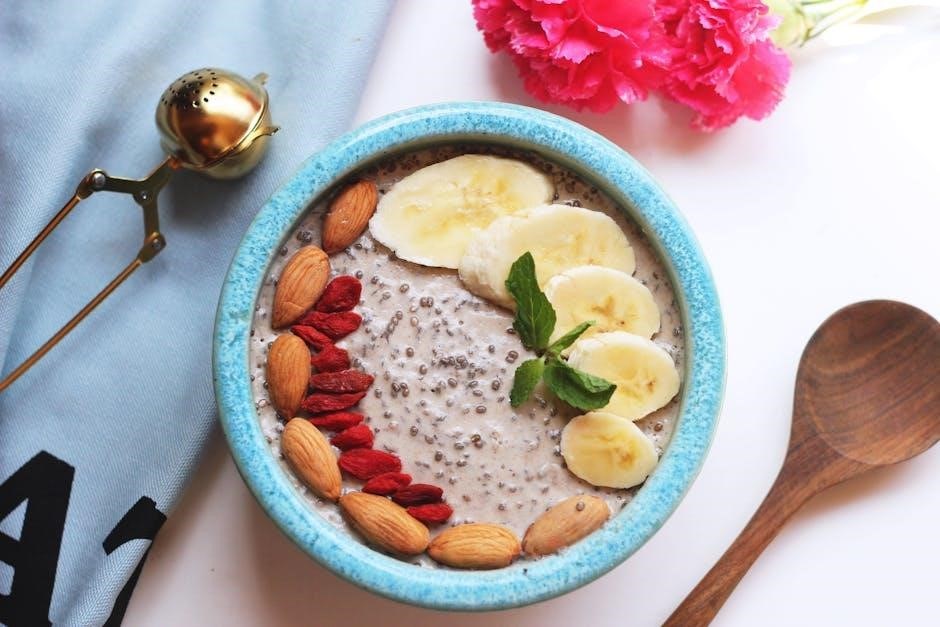A healthy lifestyle is a way of living that lowers the risk of serious illness and early death. It combines a balanced diet‚ regular physical activity‚ mental well-being‚ and avoiding harmful habits. Adopting such a lifestyle helps improve overall health‚ boost energy levels‚ and increase life expectancy. By making informed choices‚ individuals can create a sustainable path to wellness‚ enhancing both body and mind.
1.1 Defining a Healthy Lifestyle
A healthy lifestyle is a holistic approach to living that emphasizes well-being. It involves a balanced diet‚ regular physical activity‚ mental health care‚ and avoiding harmful habits. This approach reduces the risk of chronic diseases and enhances overall quality of life. By adopting healthy habits‚ individuals can achieve long-term wellness and improve their life expectancy. A healthy lifestyle is sustainable and adaptable‚ focusing on small‚ consistent changes for lasting benefits.
1.2 Importance of Health and Fitness
Health and fitness are crucial for maintaining physical and mental well-being. Regular exercise improves cardiovascular health‚ strengthens muscles‚ and enhances flexibility. A fit lifestyle reduces the risk of chronic diseases like diabetes and heart conditions. Additionally‚ physical activity boosts mood‚ energy levels‚ and sleep quality‚ contributing to overall life satisfaction. Prioritizing health and fitness fosters resilience and supports long-term vitality‚ making it essential for a fulfilling life. Consistency is key to achieving these benefits.
Nutrition and Diet
A healthy diet provides essential nutrients‚ supporting energy and overall well-being. Focus on variety‚ including fruits‚ vegetables‚ lean proteins‚ and whole grains‚ while limiting processed foods.
2.1 The Basics of a Balanced Diet
A balanced diet consists of a variety of foods from all food groups‚ ensuring adequate nutrients for optimal health. It includes fruits‚ vegetables‚ whole grains‚ lean proteins‚ and healthy fats. Limiting processed foods‚ sugary snacks‚ and excessive alcohol is crucial. Proper hydration is also essential‚ with water making up a significant portion of daily intake. This approach supports energy levels‚ digestion‚ and overall well-being‚ reducing the risk of chronic diseases. Eating mindfully and portion control are key components of a balanced diet.
2.2 Importance of Hydration
Hydration is essential for maintaining bodily functions‚ as water makes up a significant portion of our bodies. Proper hydration supports digestion‚ circulation‚ and temperature regulation‚ while also boosting energy levels and skin health. Even mild dehydration can lead to fatigue and difficulty concentrating. Drinking enough water is crucial for physical performance and overall well-being. Aim to consume at least eight glasses of water daily‚ and incorporate water-rich foods like fruits and vegetables to stay hydrated effectively.
2.3 Meal Planning for Optimal Health
Meal planning is a cornerstone of a healthy lifestyle‚ ensuring balanced nutrition and reducing the risk of unhealthy choices. By creating a weekly schedule‚ you can incorporate a variety of whole foods‚ fruits‚ vegetables‚ lean proteins‚ and whole grains. Consider your dietary needs and preferences to tailor meals effectively. Prepping meals in advance saves time and ensures consistency. A well-planned diet promotes energy‚ supports weight management‚ and helps prevent chronic diseases‚ fostering overall well-being.
Exercise and Physical Activity
Regular exercise is vital for maintaining physical health‚ boosting energy‚ and reducing disease risks. Aim for 150 minutes of moderate activity weekly to enhance overall well-being.
3.1 Types of Exercise: Aerobic‚ Anaerobic‚ and Flexibility
Exercise is categorized into aerobic‚ anaerobic‚ and flexibility training. Aerobic exercises‚ such as walking or cycling‚ improve cardiovascular health and endurance; Anaerobic activities‚ like weight lifting or sprinting‚ build muscle strength and power. Flexibility exercises‚ including yoga or stretching‚ enhance mobility and reduce injury risk. Balancing these types ensures a well-rounded fitness routine‚ promoting overall physical health and longevity.
3.2 Creating a Daily Fitness Routine
A daily fitness routine should be realistic and tailored to your goals. Start with moderate activities like walking or light exercises‚ gradually increasing intensity. Incorporate a mix of aerobic and strength training to build endurance and muscle. Schedule workouts at the same time daily to establish a habit. Allow rest days for recovery and track progress to stay motivated. Consistency is key to achieving long-term health benefits and maintaining a balanced lifestyle.
3.3 Tracking Progress and Staying Motivated
Tracking progress is essential for staying motivated. Use apps like Samsung Health to monitor daily activities and set achievable goals. Celebrate milestones‚ no matter how small‚ to maintain enthusiasm. Incorporate activities you enjoy to keep routines engaging. Listen to your body and adjust as needed. Consistency is key‚ so stay positive and remind yourself of the long-term benefits of a healthier‚ more active lifestyle.

Mental Health and Wellness
Mental health is crucial for overall wellness. Managing stress‚ practicing mindfulness‚ and ensuring adequate sleep can significantly improve emotional well-being and resilience in daily life.
4.1 The Role of Mental Health in Overall Wellness
Mental health plays a vital role in overall wellness‚ influencing emotional stability‚ cognitive function‚ and physical health. A healthy mind supports better stress management‚ improves relationships‚ and enhances daily functioning. Prioritizing mental well-being through practices like mindfulness‚ therapy‚ and self-care can lead to a balanced and fulfilling life‚ reducing the risk of chronic diseases and promoting resilience against life’s challenges.
4.2 Managing Stress for Better Health
Managing stress is crucial for maintaining overall health. Chronic stress can lead to anxiety‚ depression‚ and physical ailments like hypertension. Effective strategies include mindfulness‚ exercise‚ and time management. Engaging in activities like walking or yoga can reduce stress levels. Prioritizing tasks and setting realistic goals also helps. Building a support network and practicing relaxation techniques‚ such as deep breathing‚ can further enhance emotional well-being and improve resilience against stress.
4.3 The Impact of Sleep on Health
Quality sleep is essential for physical and mental restoration. During sleep‚ the body repairs tissues‚ strengthens immunity‚ and processes emotions. Chronic sleep deprivation links to obesity‚ diabetes‚ cardiovascular issues‚ and impaired cognitive function. Adults need 7-9 hours of sleep nightly. A consistent sleep schedule‚ a relaxing bedtime routine‚ and a calming environment can improve sleep quality. Prioritizing sleep enhances overall health and daily functioning‚ making it a cornerstone of a healthy lifestyle.

Weight Management
Maintaining a healthy weight through balanced diet and regular exercise is crucial for overall well-being. It reduces chronic disease risks and improves energy levels and longevity.
5.1 Understanding Healthy Weight Loss
Healthy weight loss involves gradual‚ sustainable changes to diet and exercise. Aim for 1-2 pounds per week by reducing calorie intake and increasing physical activity. Focus on nutrient-rich foods‚ portion control‚ and regular workouts. Crash diets often lead to rebound weight gain‚ while balanced habits promote long-term success and improved overall health. Patience and consistency are key to achieving and maintaining a healthy weight.
5.2 Maintaining a Healthy Weight
Maintaining a healthy weight requires a balanced diet‚ regular physical activity‚ and mindful habits. Monitor calorie intake‚ incorporate strength training‚ and stay hydrated. Consistency is key to preventing weight fluctuations. Regular health check-ups and tracking progress can help sustain a healthy weight. Patience and commitment ensure long-term success‚ promoting overall well-being and confidence in maintaining a healthy lifestyle.
Healthy Aging Tips
Healthy aging involves a balanced diet‚ regular exercise‚ and mental engagement. Prioritize nutrient-rich foods‚ stay active‚ and maintain social connections to promote longevity and well-being.
6.1 Eating Well as You Age
Eating well as you age is crucial for maintaining energy‚ strength‚ and overall health. Focus on a balanced diet rich in fruits‚ vegetables‚ whole grains‚ lean proteins‚ and calcium. Stay hydrated to support digestion and bodily functions. Limit processed foods and added sugars to reduce health risks. Consider age-related changes‚ like slower digestion‚ and opt for nutrient-dense meals to ensure proper nourishment and vitality in later life.
6.2 Staying Physically Active in Later Life
Staying physically active in later life is essential for maintaining mobility‚ strength‚ and overall health. Engage in moderate-intensity exercises like walking‚ swimming‚ or cycling for at least 150 minutes weekly. Incorporate strength training to build muscle and improve balance. Choose activities you enjoy to stay motivated. Regular physical activity reduces the risk of chronic diseases‚ enhances mental well-being‚ and supports independence. Consult a healthcare provider to create a safe‚ tailored routine that suits your needs and abilities.
Avoiding Harmful Habits
Avoiding harmful habits like excessive alcohol consumption and smoking is crucial for a healthy lifestyle. These habits increase the risk of chronic diseases and early mortality.
7.1 The Risks of Excessive Alcohol Consumption
Excessive alcohol consumption poses significant health risks‚ including liver damage‚ heart disease‚ and increased cancer risk. It can impair cognitive function‚ weaken the immune system‚ and lead to addiction. Chronic heavy drinking also contributes to mental health issues‚ such as depression and anxiety. Moderation is key‚ as even small amounts can be detrimental to overall health. Avoiding alcohol entirely is often advised for pregnant women‚ adolescents‚ and those with certain medical conditions.
7.2 Quitting Smoking for Better Health
Quitting smoking significantly improves health‚ reducing risks of heart disease‚ lung cancer‚ and premature aging. Within 20 minutes‚ heart rate stabilizes‚ and circulation improves. Long-term benefits include enhanced lung function and lowered cancer risks. Nicotine withdrawal can be challenging‚ but the rewards of a healthier life make it worthwhile. Professional support and personalized plans can help individuals overcome addiction and achieve lasting results for better overall well-being.

Supplements and Vitamins
Supplements and vitamins are essential for maintaining health‚ filling nutritional gaps‚ and supporting bodily functions. They help prevent deficiencies and enhance overall well-being when chosen appropriately.
8.1 Do You Need Dietary Supplements?
Dietary supplements can help fill nutritional gaps‚ especially for those with restricted diets or deficiencies. They support immune function‚ energy levels‚ and overall health. However‚ not everyone needs them. Consulting a healthcare provider ensures they align with individual needs and prevent over-supplementation. A balanced diet is often sufficient‚ but supplements can provide additional benefits when necessary.
8.2 Choosing the Right Vitamins for Your Needs
Selecting the right vitamins involves understanding your dietary needs and health goals. Multivitamins are a good start for general wellness‚ while specific vitamins like vitamin D or B12 target particular deficiencies. Age‚ gender‚ and lifestyle factors also influence choices. Always consult a healthcare provider to avoid excess and ensure safety. Quality and bioavailability are key when picking supplements for optimal health benefits.
Disease Prevention
A healthy lifestyle plays a crucial role in preventing chronic diseases. Regular exercise‚ balanced nutrition‚ and mental well-being reduce the risk of conditions like heart disease and diabetes. Prioritizing preventive care‚ such as check-ups and vaccinations‚ further enhances health outcomes‚ ensuring long-term wellness and reducing the likelihood of illness.
9.1 Exercise and Nutrition in Disease Prevention
Regular exercise and balanced nutrition are key to preventing chronic diseases. Physical activity strengthens the heart‚ improves circulation‚ and reduces the risk of conditions like diabetes and hypertension. A diet rich in fruits‚ vegetables‚ and whole grains provides essential nutrients‚ while limiting processed foods and sugars helps maintain a healthy weight. Together‚ these habits create a strong defense against illness‚ promoting long-term health and well-being.
9;2 The Role of Regular Health Check-ups
Regular health check-ups are essential for maintaining overall well-being and preventing diseases. They enable early detection of potential health issues‚ allowing for timely interventions. Check-ups often include blood pressure‚ cholesterol‚ and blood glucose screenings‚ which help identify risks for heart disease‚ diabetes‚ and other conditions. Routine exams also promote better management of chronic illnesses and ensure vaccinations are up-to-date‚ fostering long-term health and disease prevention.

Healthy Recipes
Healthy recipes focus on quick‚ nutritious meals and snacks using fresh ingredients. They emphasize balanced nutrition‚ avoiding high sugar or salt‚ and promoting overall wellness through cooking.
10.1 Quick and Nutritious Meal Ideas
Quick and nutritious meals are essential for a healthy lifestyle. Incorporate fresh vegetables‚ lean proteins‚ and whole grains into simple dishes like stir-fries‚ salads‚ and wraps. Smoothies and soups are also great options for fast‚ nutrient-rich meals. Planning meals in advance ensures healthy eating even on busy days‚ supporting overall wellness and energy levels.
10.2 Preparing Healthy Snacks
Preparing healthy snacks is key to maintaining energy and satisfying hunger between meals. Opt for nutrient-dense options like fruits‚ nuts‚ yogurt‚ or veggie sticks with hummus. Avoid sugary or processed foods. Portion control is essential to prevent overeating. Plan snacks in advance to ensure healthy choices‚ supporting your overall wellness and fitness goals while keeping you energized throughout the day.
